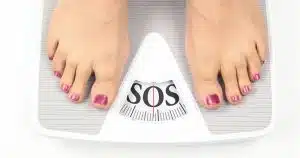If you have been following PCOS Diet Support for a while you will know how firmly I believe in a PCOS diet to help manage the symptoms of PCOS. But can this ever lead to disordered eating with PCOS?
This is something that I have been thinking about for a little while and I definitely think that we are at risk of disordered eating so it is something that we need to be aware of.
Research suggests that women with PCOS are more prone to develop an eating disorder than women without PCOS. Also, up to 39% of women with PCOS have been shown to display binge eating disorders. Thus, disordered eating is something that women with PCOS need to be aware of as they are more likely to develop irregular patterns of eating behaviours.
Let’s start by looking at what disordered eating actually is.
What Is Disordered Eating?
According to The Academy of Nutrition and Dietetics, disordered eating is a term used to describe a range of irregular eating behaviours. Irregular eating behaviours don’t necessarily mean an eating disorder, though.
So, just to be clear, I am not suggesting that women with Polycystic Ovary Syndrome are prone to eating disorders, but I do think that we are at risk of developing irregular eating behaviours.
Some of the symptoms of disordered eating include:
- Frequent dieting, anxiety associated with specific foods or meal skipping
- Chronic weight fluctuations
- Rigid rituals and routines surrounding food and exercise
- Feelings of guilt and shame associated with eating
- Preoccupation with food, weight and body image that negatively impacts the quality of life
- A feeling of loss of control around food, including compulsive eating habits
- Using exercise, food restriction, fasting or purging to “make up for bad foods” consumed
Have a look at that list. Are there any that stand out for you? Can you relate to any of this?
Let’s have a look at some of the reasons we may struggle with some of these symptoms.
Why we Need to Consider Disordered Eating with PCOS
Using a PCOS diet to manage PCOS symptoms
I have long suggested that diet is one of the most powerful ways that we can manage our PCOS. And while I still believe this is true, it can result in some anxiety if we stray too far from the recommended guidelines.
Focus on Losing Weight or Weight Gain
A lot of women with PCOS struggle with losing weight or gaining weight. This can give us a negative body image, but it also puts us at increased risk of some of those disordered eating behaviours, like frequent dieting, overtraining and feelings of guilt associated with eating.
Cravings are Real

And you are absolutely not alone!
In fact, Jeanes et al (2017) suggest that up to 39% of women with PCOS show binge eating behaviours. This does not necessarily mean that all 39% of these women had a binge eating disorder but the study did suggest that women with PCOS are prone to binge eating and should be screened for a binge eating disorder.
We’re more Prone to Eating Disorders
Interestingly, a meta-analysis of 8 studies, including 470 women with PCOS showed that women with PCOS compared with women without PCOS are more prone to the development of an eating disorder (Lee et al., 2019).
So, what does this all mean for you? Are you destined to struggle with disordered eating behaviours for the rest of your life? Absolutely not! There are some things that you can do.
How to Improve or Avoid Disordered Eating with PCOS
Get help if you need it
If you have been reading this and alarm bells are ringing, you may want to think about seeking professional help. If food or even body image has become something of an obsession or it dominates your thought life, perhaps it is time to see someone who specializes in treating eating disorders.
Yes, PCOS can be managed by the foods that we eat. But, obsessing or thinking about food or your PCOS all of the time is not helpful longer-term and may seriously impact on your quality of life.
Follow the 80/20 Principle

And that is OKAY!
If you were to follow the guidelines for a PCOS diet 80% of the time, it gives you leeway to “let your hair down” and not give in to the guilt and shame associated with it. Does that mean that we can all go on a binge?
No. Binge eating is defined as “the consumption of large quantities of food in a short period of time, typically as part of an eating disorder.”
Giving yourself the freedom to stray from your normal eating patterns does not mean that you have to completely binge. Eating less healthy food choices in moderation is very different from displaying binge eating behaviours that are unhealthy in the long term.
Avoid Fad or Crash Diets
Dr Gottlieb is a clinical psychologist specializing in the treatment of eating disorders. She recommends that we avoid fad or crash diets. They tend to be too restrictive and can be hard to sustain. So, although we may be able to stick to them over the short term, longer-term they are likely to result in binge eating behaviours.
Change your Focus

For example, instead of thinking “I’m going to restrict my calories to x amount to help me lose weight.” Change the narrative to “I’m going to focus on eating a wide variety of whole foods and less processed foods to better manage my hormones and be healthy with my PCOS.”
The focus is on longer-term health, not just weight loss.
In summary, in our effort to be as healthy as we can with PCOS, we need to be aware of the risk of developing disordered eating patterns and try to steer clear of this. If you do feel you have developed unhealthy eating patterns and need extra help, I really want to encourage you to seek professional help.
If you have any experience of disordered eating with PCOS, I would love to hear from you and learn from your experience of this all-important topic!
- sustainable pcos weight loss strategies
- Over 5500 women have done it and seen results
- [bonus] Done for you pcos meal plans
- [bonus] intermittent fasting for pcos course
- [BONUS] personalised nutrition plan
JOIN OVER 5,500 OTHERS
References:
1Lee, I; Cooney, LG; Saini, S; et al. Increased odds of disordered eating in polycystic ovary syndrome: a systematic review and meta-analysis. EATING AND WEIGHT DISORDERS : EWD, 2019.
2Jeanes, Y, M; Reeves, S; Gibson, E.L; et al. Binge eating behaviours and food cravings in women with Polycystic Ovary Syndrome. APPETITE, 2017.








